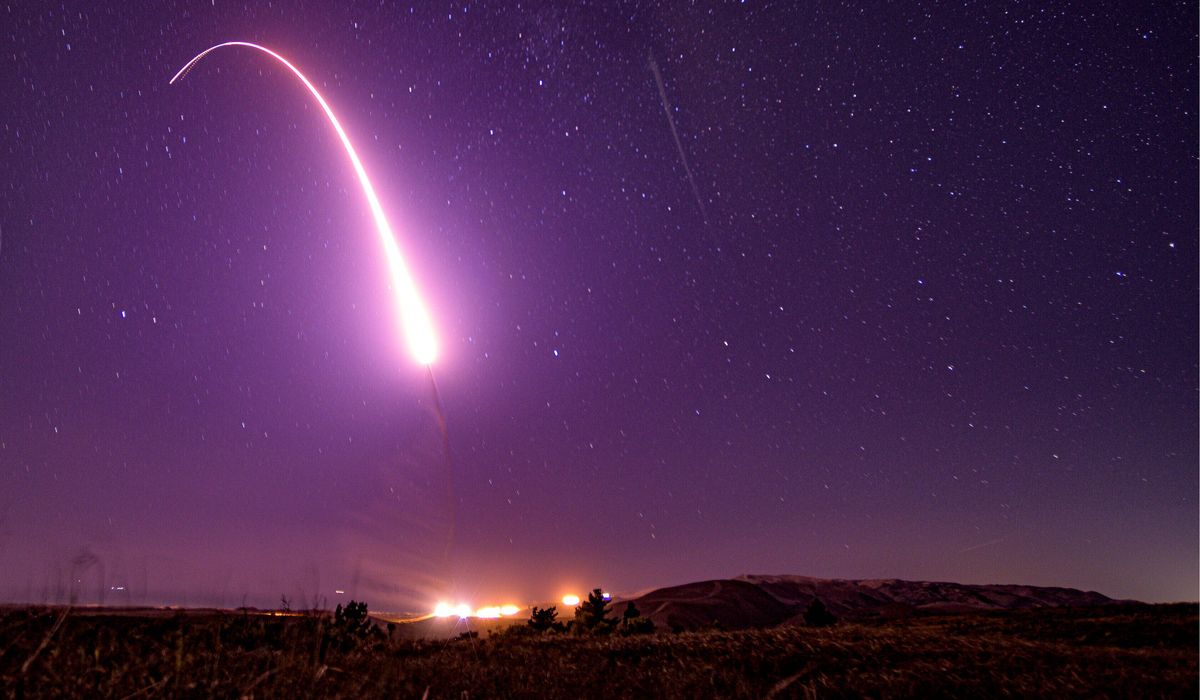
The American strategy for deterring nuclear war is outdated and needs to be revised to address more likely scenarios, such as nuclear conflict growing out of a conventional war with China or Russia, according to Paul Bracken, a political science professor at Yale University.
Mr. Bracken told the Senate Armed Services Committee on Wednesday that too much attention is focused by military and defense officials on the most unlikely nuclear war scenarios. Some 90% of strategic military efforts today seek to deter surprise nuclear attacks from China or Russia, with 10% focused on an accidental war, he said.
“I believe that we have, relatively speaking, too much deterrence against the surprise attack,” Mr. Bracken said. “So I do not mind reducing deterrence of this in favor of increasing attention to other contexts and scenarios. That the United States could be fighting on the doorstep of nuclear weapon states — areas bristling with much larger numbers of weapons than today — is the real deterrence challenge.”
The dangers of nuclear conflict have increased as the Cold War standoff between Washington and Moscow is now complicated by China‘s large-scale nuclear buildup, Russia’s new, exotic strategic arms and the expansion of other nuclear arsenals.
“We now are in a multipolar nuclear world,” Mr. Bracken said. “It isn’t just Russia with the bomb anymore. China is doubling its nuclear forces, according to the director of national intelligence. Pakistan could have 300 weapons in 10 years. If China and Pakistan expand, it is hard to believe that India will not respond accordingly.”
Russia, for its part, is building a high-speed underwater drone with a 100-megaton warhead that will be the largest nuclear bomb ever deployed, capable of creating tsunamis that can destroy cities and ports. Moscow and Beijing are building large forces of short- and medium-range nuclear missiles, upping the ante that a future conventional conflict will go nuclear.
North Korea is expected to have 150 nuclear weapons in 10 years, along with long-range missiles capable of ranging U.S. targets, and shorter-range systems targeting Japan and South Korea.
Mr. Bracken sees China‘s nuclear might as among the most worrying sources for inducing a future strategic war as China builds a triad of nuclear missiles, missile submarines and bombers. Academic studies of China‘s nuclear strategy misunderstood Beijing‘s relatively small nuclear warhead stockpile and its declared “no first use” policy.
“This narrow framing of the problem needs serious reconsideration,” Mr. Bracken said.
Mr. Bracken said it is not clear whether China has developed the doctrine and policies needed for the use of nuclear arms and whether they would be used if conflict breaks out over Taiwan or on the Korean Peninsula.
“Reading Chinese nuclear doctrine as I have convinces me that they haven’t thought this through,” he said. “China‘s declared nuclear doctrine doesn’t cover a wide range of possibilities beyond what it was narrowly written for.”
Beijing‘s vastly expanded nuclear power, he said, provides the Chinese Communist Party with new opportunities for political coercion and blackmail.
“It may be intended to deter U.S. conventional intervention by posing nuclear risks to offset new U.S. technologies like cyber and super-precision strike,” Mr. Bracken said.
Key to Beijing‘s strategic calculus is the 1958 Taiwan crisis, when Chinese communist and nationalist forces squared off at the islands of Quemoy and Matsu on the east coast of China across from Taiwan. The skirmish was China‘s Cuban missile crisis because the U.S. at the time had nuclear weapons on Taiwan.
Declassified documents from the crisis reveal that the U.S. Air Force was prepared to use nuclear weapons to counter a Chinese assault on the islands. President Eisenhower, however, rejected the use of nuclear arms, even if Beijing invaded the outer islands. The lack of backing from Moscow and the inability to deter a U.S. nuclear attack launched Beijing on its drive for a nuclear arsenal.
NAVAL EXPERT WARNS OF CHINA‘S ‘DECADE OF DANGER’
The next 10 years will be a period of intensifying conflict between the United States and China below the level of a kinetic war, according to Andrew S. Erickson, professor of strategy at the Naval War College. Beijing is engaged in extensive “gray zone” operations in the seas around China that have increased tensions.
“Fortunately, the United States and its allies and partners can likely avoid great power war with China,” Mr. Erickson told the newsletter The Wire China. “Instead, the situation we’re likely to face over the next few years — in what might be called a ‘decade of danger’ — are periods of friction, tension, and even crisis.”
Peacetime gray zone conflicts are reflected in China‘s drive to advance disputed maritime claims in the South China Sea and East China Sea, as well as undermining regional states’ rights and interests. Gray zone military and quasi-military operations are designed to avoid triggering a direct military conflict.
The operations take the form of incidents in international waters and in some cases are defused with little impact.
“At other times, China acquires control of additional physical territory or maritime zones in the process,” Mr. Erickson said.
The seizure of Scarborough Shoal in the Spratly Islands in 2012 is a key example. China used its coast guard and maritime militia forces to prevent the Philippine government from enforcing environmental regulations inside Manila’s exclusive economic zone.
The Obama administration failed to take any action against the Chinese for the Scarborough seizure, setting off a massive Chinese island-building campaign and maritime territory seizure campaign based on the Scarborough Shoal model.
Chinese harassment of U.S. Navy vessels has also highlighted the gray zone war.
The most serious incident was the 2009 harassment of the USNS Impeccable surveillance ship in the South China Sea that was confronted by five Chinese ships and forced to leave the area.
“Again, unfortunately, the U.S. apparently never imposed a cost for this unlawful, unacceptable PRC behavior,” Mr. Erickson said. “Nor did the U.S. government even publicly state that China‘s maritime militia had been involved.”
The Chinese maritime activities are part of a concerted effort by Beijing to control the region near its coasts by “winning without fighting.”
“It’s a gradual process. But over the course of years, combined with the fortification of the PRC’s South China Sea outposts, something very significant is happening over time,” Mr. Erickson said.
State Department spokesman Ned Price did not answer directly when asked this week whether the United States’ 40-year policy of engaging China in the hope of prompting liberalization of the communist regime had failed. The Trump administration undertook a major shift in U.S. policy by adopting a hard line on Beijing, and several of the Trump policies have been adopted for now by the Biden administration.
“We have always said is that it is a relationship that is multifaceted,” Mr. Price told reporters. “It is a relationship that will have competitive elements. It is a relationship that will have adversarial elements. And it is a relationship that will have some cooperative elements.”
Overall, the U.S.-Chinese relationship is “predicated on competition,” he said.
“Our goal in not only engaging with Beijing, but also with our partners and allies and also here at home, harnessing our domestic sources of strength, is to be able to compete and ultimately to outcompete with China,” Mr. Price said. “This is an approach that, while it has human rights at the center, it is not an approach that requires any rose-colored glasses about the nature of the PRC, the nature of its leadership.”
Pressed on whether conciliatory policies toward China were misguided, Mr. Price declined to say.
“I’m not going to speak to previous administrations. I’m going to speak to this administration’s approach, and that’s precisely our approach. It is a clear-eyed, principled approach to the PRC that recognizes competition at the center of that relationship.”
Mr. Price said the administration still hopes to cooperate with Beijing on some issues, including climate change, arms nonproliferation and Iran.
• Contact Bill Gertz on Twitter at @BillGertz.







